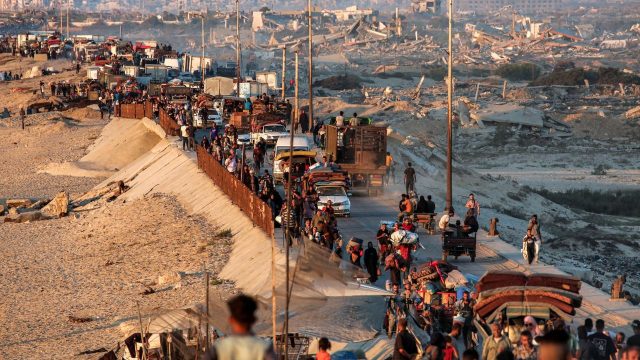
A United Nations Commission of Inquiry’s finding that Israel has committed genocide has been described as a landmark moment after nearly two years of attacks that have killed at least 64,964 people in Gaza.
The Commission cited statements by Israeli leaders, and the pattern of conduct by Israeli forces, as evidence of genocidal intent, and said its latest report was “the strongest and most authoritative UN finding to date” on the war.
Israel for its part firmly denies accusations of genocide and insists it’s conducting the war in Gaza in self-defence and in accordance with international law.
What did the commentators say?
The findings will have a “profound impact” on Britain’s legal system, wrote Paul Nuki in The Telegraph, because they will “make it harder” for governments to argue that sanctions are not needed when lawyers “point to” the report of the independent UN Commission.
The British government has previously said it hasn’t concluded that Israel is acting with genocidal intent, but that position will now “almost certainly be challenged” in the UK courts, with lawyers using the report as “evidence to support their case”.
Although the reports are “not formally binding” for the work of international courts, they have a “strong persuasive value”, Professor Triestino Mariniello, an international law expert who is representing Gaza victims before the International Criminal Court, told the Palestine Chronicle.
The International Court of Justice (ICC) “cannot ignore” what the commissioners have said, and the Office of the Prosecutor of the ICC “should expand the scope of the investigations and finally cover the crime of genocide”. There are “no more excuses for the Prosecutor” because this gives “unprecedented legal and political weight to the charge of genocide in Gaza”.
The findings will “feed into the growing international condemnation” of Israel’s conduct, said Jeremy Bowen on the BBC, as it also comes from Israel’s “traditional Western allies” and the “Gulf Arab monarchies that normalised relations with Israel in the Abraham Accords”.
“Legally, it is hard to prove the crime of genocide,” but as the war in Gaza is “continuing and perhaps escalating further”, the report is “going to deepen international divisions”.
Many Western countries, including the UK, have said that only a court can rule on whether genocide has been committed, wrote Bel Trew on The Independent, but that outcome “could take years”, and it may “take a decade” for the International Court of Justice to rule. At this “slaughterous rate”, by then there “won’t be much of Gaza – or its residents – left”.
What next?
Meanwhile, Israel has launched its “long-threatened” ground offensive in Gaza City, said Julian Borger in The Guardian.
The offensive has seen the most “punishing attacks” on the city in two years of war, said Lorraine Mallinder on Al Jazeera, causing “columns of vans and donkey carts laden with furniture and people on foot carrying the last of their worldly possessions” to flee against a “backdrop of black smoke rising from the destroyed city”.
Commission of Inquiry’s findings ‘give unprecedented weight’ to genocide claims






